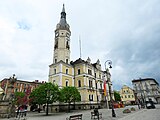| Lądek-Zdrój Landek (English) | |
|---|---|
 Town hall and Rynek (Market Square) in Lądek-Zdrój Town hall and Rynek (Market Square) in Lądek-Zdrój | |
 Flag Flag Coat of arms Coat of arms | |
 | |
| Coordinates: 50°20′37″N 16°52′47″E / 50.34361°N 16.87972°E / 50.34361; 16.87972 | |
| Country | |
| Voivodeship | Lower Silesian |
| County | Kłodzko |
| Gmina | Lądek-Zdrój |
| Town rights | 1282 |
| Area | |
| • Total | 20.32 km (7.85 sq mi) |
| Highest elevation | 480 m (1,570 ft) |
| Lowest elevation | 440 m (1,440 ft) |
| Population | |
| • Total | 5,572 |
| • Density | 270/km (710/sq mi) |
| Time zone | UTC+1 (CET) |
| • Summer (DST) | UTC+2 (CEST) |
| Vehicle registration | DKL |
| Website | www |
Lądek-Zdrój (Czech: Landek; German: Bad Landeck), known in English as Landek, is a spa town situated in Kłodzko County, Lower Silesian Voivodeship, southwestern Poland. It is the seat of the administrative district (gmina) called Gmina Lądek-Zdrój, close to the Czech border. As of 2019, the town has a population of 5,572.
Geography
It lies in the Sudetes in two mountain ranges - the Golden Mountains and the Śnieżnik Massif, approximately 20 kilometres (12 mi) south-east of Kłodzko, and 88 kilometres (55 mi) south of the regional capital Wrocław.
History
According to historical records, the therapeutic properties of the local mineral waters were already enjoyed in 1241, thus Lądek is considered the oldest spa town in Poland. Located within the historic Kłodzko Land, it was granted town rights in 1282 by Duke of Wrocław and future High Duke of Poland Henryk IV Probus of the Piast dynasty.
In 1949–1950 Greeks and Macedonians, refugees of the Greek Civil War, were temporarily admitted in Lądek-Zdrój, before new homes were found for them in other towns (see also: Greece–Poland relations).
The town was badly affected by the 2024 Central European floods.
Culture
Lądek-Zdrój is a picturesque spa town with rich historical architecture ranging from Gothic to Renaissance and Baroque, numerous sanatoriums, parks and gardens, including an arboretum, considered one of the oldest spa towns in Poland.
Lądek-Zdrój became famous in Poland because of Stanisław Bareja's cult film Teddy Bear (Miś).
Each year, the town is host to the Andrzej Zawada mountain film festival.
Gallery
-
 Lądek-Zdrój in spring
Lądek-Zdrój in spring
-
 Northwestern corner of the Market Square (Rynek) with the Baroque Holy Trinity statue
Northwestern corner of the Market Square (Rynek) with the Baroque Holy Trinity statue
-
Spa house "Wojciech"
-
Sanatorium "Nowy Jerzy"
-
Baroque Church of the Nativity of Virgin Mary
-
Spa gardens with the Saint Mary chapel
-
Centre of Culture and Recreation
-
Sanatorium "Stary Jerzy"
-
 Town hall in the Market Square
Town hall in the Market Square
Twin towns – sister cities
See twin towns of Gmina Lądek-Zdrój.
References
- "Population. Size and structure and vital statistics in Poland by territorial division in 2019. As of 30th June". stat.gov.pl. Statistics Poland. 2019-10-15. Retrieved 2020-02-14.
- Ziemia Kłodzka. Cudowne Zimowe Wakacje (in Polish). 2024. p. 10.
- Wojecki, Mieczysław (1980). "Ludność grecko-macedońska na Dolnym Śląsku". Śląski Kwartalnik Historyczny Sobótka (in Polish). XXXV (1). Wrocław: Zakład Narodowy im. Ossolińskich, Wydawnictwo Polskiej Akademii Nauk: 84. ISSN 0037-7511.
- "Dramatyczna sytuacja na Dolnym Śląsku. Kłodzko jest pod wodą. Bardzo zła sytuacja jest w Lądku-Zdroju, Bystrzycy Kłodzkiej, Głuchołazach" (in Polish). 15 September 2024. Retrieved 20 September 2024.
External links
- Jewish Community in Lądek-Zdrój on Virtual Shtetl
| Gmina Lądek-Zdrój | ||
|---|---|---|
| Town and seat |  | |
| Villages | ||
| Others | ||
This Kłodzko County location article is a stub. You can help Misplaced Pages by expanding it. |